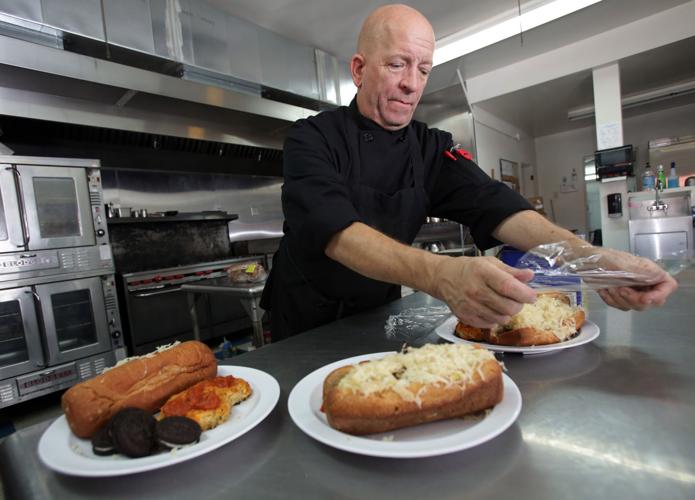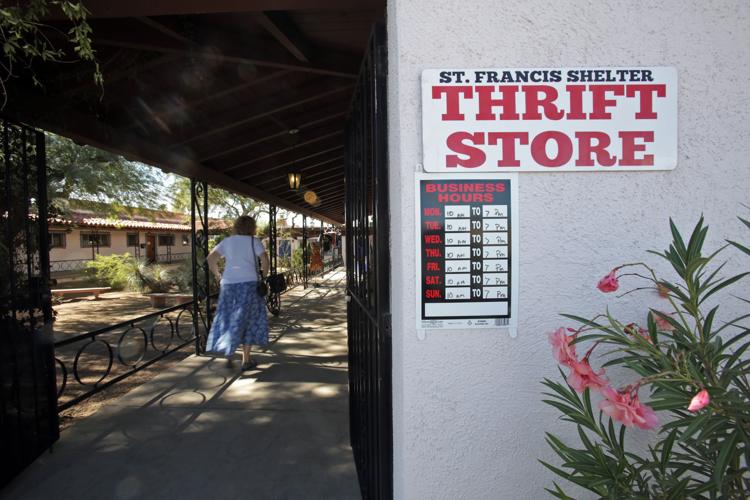Through the eyes of some, the men who line up at the gate of St. Francis Shelter look like ne’er-do-wells.
To the shelter’s director, Carl Zawatski, they look like brothers and budding entrepreneurs.
Earlier this year he moved into the shelter — on the site of the former Sacred Heart School — as part of an agreement with the church council to create a workforce that helps raise money for the busy summer and winter shelter seasons.
“I told the church council, ‘These are the lepers of today; St. Francis kept company with lepers,’” Zawatski said. “The majority of parishioners were supportive.”
He was able to hire seven workers, who aside from being granted room and board, earn $30 a week.
Jobs range from kitchen workers to groundskeeper, store manager and security detail for both the shelter, Sacred Heart Church and surrounding businesses.
Zawatski said he chose which seven to hire by observing their body language and interactions with others.
“You’ll see a guy standing at the gate with a walker and one guy walks over and opens the gate for him,” he said. “You see who’s who.”
The men are learning responsibility and soft skills, such as tidiness and punctuality.
Last month, the shelter opened a thrift shop in a former dental office on First Avenue, just north of Fort Lowell Road, near the church.
The 1,300-square-foot shop is stocked with clothing, toys, kitchenware and books and is open daily from 10 a.m. to 7 p.m. Two store employees have learned how to stock racks neatly and keep a cash register.
“Here the guys are learning customer service skills,” Zawatski said.
The workers upgraded the old school kitchen and two employees were assigned to cooking duties.
One worker mans a golf cart and responds to other businesses in the area if an aggressive panhandler is on site.
The landlord appreciated the added security and gave St. Francis a break on the rent to open the thrift store.
Jacob Terry, 26, is one of the employees who works in the thrift shop.
“It’s an opportunity for me to help out the community,” he said. “This keeps my mind off of bad things.”
He declined to detail how he ended up at the shelter.
“Eventually I want to get back on my feet,” Terry said. “This was a good opportunity to find my feet.”
With no way to commute to his house in Sahuarita after losing his driver’s license, Dennis Mitchell, 61, stayed on the streets in Tucson to look for work.
“This opportunity changed my life,” he said. “I had no purpose but drinking and hanging out with bad friends.”
Mitchell sold his house in Sahuarita and moved into the shelter as the head chef.
His late brother was a master chef and Mitchell had traveled with him and learned his cooking style.
Aside from cooking for the shelter’s employees, he cooks for the masses when the shelter is operating and even caters some church events.
“I like to cook it all,” Mitchell said. “And, I like the challenge of sifting through the Food Bank for the finest restaurant ingredients.”
Mitchell has also bonded with the church and plans to be baptized Catholic.
“I was selfish and didn’t care about others,” he said. “It feels better to give.”
The winter season for the shelter begins next month and there’s capacity for 89 men.
Many of the men are in recovery so the shelter hosts AA meetings and each day begins with prayer and meditation.
Zawatski, 61, smiles when asked how he ended up in the shelter.
“The joke around here is you’ve got to be a special kind of stupid to take this on,” he said.
“Look, I’ve got a spotted past, I’m nine years sober and I’m coming from behind so I’d like to catch up,” Zawatski said. “This is my way to give back.”
Is it rewarding?
“Depends on what day you’re asking,” he said. “Some days I do get burned out but I just put one foot in front of the other.”





